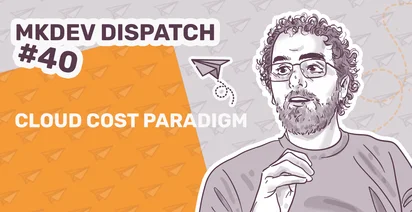Cloud Cost Paradigm | ✉️ #40

Hey! 👋
When I go to a restaurant and ask the waitress if what I've ordered is enough or if I need to order more food, I always have a doubt. Will this person be honest and tell me the truth? Are 5 dishes for 3 people appropriate, or will the portions be so large that she is just suggesting ordering more to increase the bill?
This issue is complicated because it involves asking for advice on whether to spend more money from someone who will benefit financially from your decision. Of course, if I perceive that they are trying only to get my money, I will not return. There are thousands of restaurants where I can eat.
Now, imagine a city with only three restaurants. And even, once you become a member of one, switching to another becomes almost impossible. Now, you find yourself dining at one restaurant without the option to try another. Would you trust the waitress who suggests ordering more in this situation?
This is the same experience that you can have daily with our cloud service provider. Can we trust that they will offer us the cheapest services, or will they try to increase the bill to earn more money? It's important to recognize that once you choose a cloud service provider, switching is very difficult. Every day there are new services that are harder to understand, billing is never transparent or easy to grasp, there are many hidden elements in the bill, among other details.
So, what can we do? Ideally, we should check our bills daily, security each of the components, review the resources we are not using, and ultimately audit our systems to identify errors and how to improve our infrastructure to reduce costs and find the hidden expenses. And this is where mkdev can help you.
What We've Shared
On our Youtube channel Pablo continues with GCP costs optimization, while Kirill made a companion piece to our recent AI article:
Google Cloud Run always-on vs on-demand CPU allocation: Diving into the nuances of Google Cloud Run's CPU allocation options, comparing always-on and on-demand configurations to help you make an informed decision for your cloud-based applications.
How to add alt text to 1000 images with GPT-4 Vision AI: Creating alt text for images used to be a hard manual process. With GPT-4 Vision, we can do it quickly and cheaply for 1000 images at the time. In this video, we shared how mkdev implemented such automation with AI.
DevOps Accents #32: Platform Strategy and the Future of Platform Engineering with Jean-Francois Landreau
And on the website Argo CD Lightning Course comes to an end.
What We've Discovered
Images as Code: The pursuit of declarative image builds. Besides being an amazing article about making building container images a nicer process, this text has plenty of useful tools mentioned and that are worth looking into!
Serverless Data Processor using AWS Lambda, Step Functions and Fargate on ECS (with Rust): Great example of binding together multiple serverless offerings from AWS to do batch data processing - and giving Rust a go at the same time.
5 AWS/GCP Terraform Gotchas: A few good tips that will make your terraforming easier, especially if you are configuring load balancers in AWS or GCP.
Mastering Terraform: Best Practices for Scalable, Secure, and Reliable Infrastructure as Code. 45 tips, many of which will seem obvious to an experienced Terraform user, but in total this is a great list of how to make your Infra as Code setup decent.
Are Aurora Performance Claims True? Short answer is "yes, if you don't tune MySQL database. But the article worth reading even knowing the outcome - lots of good hints, numbers, charts and investigation inside.
An invitation
Want to be among the first people to be on the mkdev subreddit? Join it now! We're figuring out how exactly we'll use it, but feel free to post there about mkdev or anything DevOps and Cloud related :)
The 41st mkdev dispatch will arrive on Friday, March 29th. See you next time!
